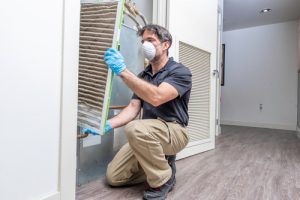 How Often Should Commercial HVAC Filters Be Changed?
How Often Should Commercial HVAC Filters Be Changed?
Commercial HVAC (Heating, Ventilation, and Air Conditioning) systems are essential for maintaining a comfortable environment for employees, customers, and visitors. One of the most important components of an HVAC system is the air filter, which helps to maintain clean indoor air quality. Over time, commercial HVAC filters can become clogged with dust, dirt, and other contaminants, reducing their effectiveness and causing the HVAC system to work harder to maintain the desired temperature. In this blog post, we’ll discuss how often commercial HVAC filters should be changed to ensure optimal performance and indoor air quality.
The Importance of Changing HVAC Filters
Dirty and clogged air filters can negatively impact the air quality and energy efficiency of the HVAC system. Filters that are not changed regularly can lead to lower airflow, leading to inefficient performance, higher energy bills, and an increased risk of equipment failure. Air filters also prevent airborne contaminants, such as allergens, dust, and bacteria from entering the indoor space, thereby improving indoor air quality. Dirty filters can compromise indoor air quality, leading to a range of health issues, such as respiratory problems, allergies, and asthma.
Factors That Affect How Often to Change Commercial HVAC Filters
Several factors determine how often the air filters in your commercial HVAC system require changing. The frequency of filter changes depends on:
1. Filter Type
The type of filter you use in your HVAC system will determine how frequently you need to replace it. Some filters are designed to last for several months, while others need changing every few weeks. Generally, high-efficiency filters have a longer lifespan than standard filters, but they can cost more initially.
2. Usage
The amount of use your HVAC system gets will also determine how often the filters must be replaced. High-traffic commercial buildings with more occupants and activity levels may need to replace HVAC filters frequently than low-traffic buildings, which experience less occupancy.
3. Pollutants
If your commercial building is situated in areas with dust, bacteria, pollen, pet dander, and other allergens, you may need to change filters more frequently. A commercial building with an industrial process that generates more pollutants, such as factories, may need to change filters more frequently than a commercial office space.
4. Humidity
Humidity levels in your commercial building can also affect how often you must change your HVAC filters. Higher humidity levels can promote mold growth, which can cause respiratory problems, irritations, and allergies. Mold spores can accumulate in the HVAC filter, reducing its efficiency and lifespan.
How Often to Change Commercial HVAC Filters
Now that we’ve discussed the factors that determine how often you need to change HVAC filters, let’s look at the recommended time frames for commercial HVAC filter replacement.
1. Standard Air Filters
These are the most common types of filters, typically made of fiberglass and are disposable. They are the least expensive type of filter and have a lifespan of between one to three months, depending on usage and indoor air quality.
2. Pleated Filters
Pleated filters have a higher efficiency rate than standard filters because they feature a larger surface area capable of trapping more contaminants. They are made of synthetic or polyester materials and can last up to six months depending on use and indoor air quality.
3. High-Efficiency Particulate Air (HEPA) Filters
HEPA filters have a higher MERV (Minimum Efficiency Reporting Value) rating, meaning that it can remove a higher percentage of particles from the indoor air. These filters are suitable for hospitals, laboratories where the air quality must be of the highest standard. They require frequent inspections and changes to maximize their performance, usually every six months.
4. Electrostatic Filters
These filters generate an electrical field that captures airborne particles. They can last up to five years but should be checked every six months to confirm if they need changing.
When to Change Your Commercial HVAC Filters
There are several guidelines to follow when determining the best time to change your commercial HVAC filters:
1. Check Your Filters Regularly
It’s essential to inspect the filters regularly even when you don’t notice any performance issues. Most HVAC experts suggest checking filters at least once a month and especially during peak usage periods.
2. Monitor Indoor Air Quality
If you observe that the indoor air quality is continuously diminishing, it may suggest that the HVAC filter requires changing or upgrading. If you notice that your employees or customers are coughing and sneezing with no apparent explanation, it may be due to dirty or clogged filters.
3. Check the System Itself
Inspect your HVAC system to look for signs of wear and tear. A system that is working harder to maintain the indoor temperature suggests that the filters may need changing.
4. Follow the Manufacturer’s Guidelines
The manufacturer’s recommendations for your specific HVAC filter should be your starting point on when to change your filter. This information is provided on a product’s packaging, booklet, or website.
Final Thoughts
Proper maintenance of your commercial HVAC filter is critical to maintaining optimal indoor air quality and efficient system performance. Depending on the size of the HVAC system, you may need to hire an HVAC professional to change the filters. Regular air filter inspections, monitoring indoor air quality, and implementing a filter-changing schedule are all essential steps for ensuring that your commercial HVAC filter is always working at its best. By following these guidelines, you can ensure that your HVAC system performs at its best for years to come!
